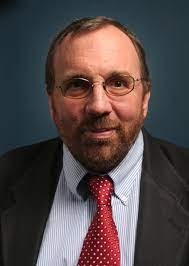
Stephen E. Cullenberg
Professor of Economics, Emeritus
Professor Stephen E. Cullenberg passed away at his home in Massachusetts from complications of progressive supranuclear palsy on February 28, 2021. Steve was 67 years old.
Steve was born October 4, 1953, at Camp Polk, Louisiana, where his parents were stationed during the Korean War. He grew up in North Easton, MA and attended Oliver Ames High School, where he played on the varsity basketball team, started the school's alternative newspaper and initiated Easton's annual Walk for Hunger. Steve graduated from Antioch College in 1976, attended graduate programs at the University of Stockholm and Princeton and received a PhD in Economics in 1988 from the University of Massachusetts Amherst. Steve came to UCR as an Assistant Professor of Economics in 1988. He served as Chair of Economics (1997-98, 1999-03), Chair of Physical Education (2001-03), and Dean of the College of Humanities, Arts and Social Sciences (2006-14). He retired from UCR in 2016.
Steve was a Marxist economist with broad and multi-disciplinary research interests. He described his research fields as “Economic Methodology, International Political Economy, and Marxian Political Economy,” but the many conferences that he organized and the numerous books that he wrote and edited reveal a much broader agenda. Among others, Steve co-edited Whither Marxism? Global Crises in International Perspective (Routledge, 1994); Marxism in the Postmodern Age: Confronting the New World Order (Guilford, 1994); Postmodernism, Economics and Knowledge (Routledge, 2001); Globalization, Culture and the Limits of the Market: Essays in Economics and Philosophy (Oxford University Press, 2003); Human Development in the Era of Globalization: Essays in Honor of Keith B. Griffin (Edward Elgar, 2006); and Sublime Economy: The Aesthetics of Economic and Cultural Value (Routledge, 2006). He also authored The falling rate of profit: Recasting the Marxian debate (1994), and co-authored Transition and Development in India (Routledge, 2013). Steve was proud of having served as Editor of the journal Rethinking Marxism: A Journal of Economics, Culture and Society in the years 1997-99, and having been an editorial board member for many years. His research interests led him to become a Cooperating Faculty Member in the Department of Philosophy and a member of the Center for Ideas and Society Advisory Committee since the mid-1990s.
As a reflection of his scholarly breadth, Steve taught over two dozen different courses. At the graduate level his courses spanned Mathematics for Economics; Alternative Microeconomic Theory; History of Economic Theory and Methodology; Marxian Political Economy; and (Re)Valuing Marx (in the English Department at UCR). At the undergraduate level, in addition to numerous standard economics courses, he taught Poverty, Justice and Discrimination; The 1960s and the Vietnam War Era (a year-long interdisciplinary course); and Freshman Seminars on Globalization and Its Discontents, and The Economics of Sports. One faculty member recalls that Steve was not one to bring detailed notes to his lectures. He was often seen jotting down a few thoughts on a post-it prior to walking across campus to teach undergraduate economics courses. Steve was a highly valued and effective teacher, having been honored with UCR’s Distinguished Teaching Award in 1998.
Steve was an institution builder, and dedicated his life to making UCR a better, more inclusive and welcoming place. He was instrumental in creating the modern economics department at UCR that resulted from the merger of faculty in CHASS and the Graduate School of Management. He also played a critical role in helping to build and strengthen the humanities and arts inside of CHASS. As a former Associate Dean recalls: “He joined in and materialized the efforts at UCR to embrace the new multi-cultural, interdisciplinary path, embracing California’s diversity and – simultaneously – the multiple voices of subaltern and excluded people, scholars, and visions that Riverside could – with the right leadership – affirm. And he was that leader.”
Steve was also an avid sports fan, and was proud of having played on his high school basketball team. For many years he had season tickets to the UCR women’s basketball games, and he was a lifelong fan of the Boston Celtics, Red Sox, and New England Patriots.
Whenever one needed to track Steve down, the surest approach was to show up at Jammin’ Bread for breakfast, or Ciao Bella or Mario's Place for dinner. He was a fixture in those places, and loved by so many.
Steve is survived by his father, Clifton Cullenberg; his sister, Paula Cullenberg and her husband Peter Crimp; his brother, Tracy Cullenberg and his wife Nancy (Frazio) Cullenberg; as well as three nephews, Matthew Markey-Crimp, James Crimp, and Graham Cullenberg, and two nieces, Carly and Gabriella Cullenberg. He was preceded in death by his mother, Peggy (Lee) Cullenberg.
Steve will forever be remembered by his colleagues and students, and the staff, in Economics and CHASS at UCR.
